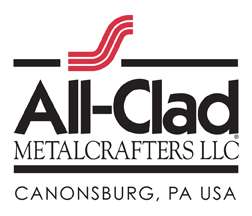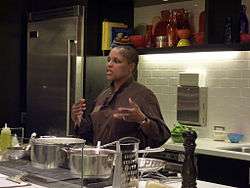All-Clad
 | |
| Private, limited liability company | |
| Industry | Consumer Goods |
| Founded | 1960 |
| Founder | John Ulam |
| Headquarters | Canonsburg, Pennsylvania, USA |
| Products | cookware, ovenware, kitchen tools, kitchen accessories |
| Parent | Groupe SEB |
| Website | all-clad.com |
All-Clad Metalcrafters, LLC is a U.S. manufacturer of cookware with headquarters in Canonsburg, Pennsylvania.[1] The company markets its cookware to department stores and specialty stores in the United States, Australia, Canada, Germany, and the UK, along with All-Clad bonded ovenware, kitchen tools, and kitchen accessories.
History

The business was founded by metallurgist John Ulam, in 1967, as a manufacturer of bonded metals, including coinage for the U.S. Mint, avionics, and ballistics.[1] The company was instrumental in the shift to bonded metal coins.[1]
The company's move to cookware happened by accident, when Ulam made a pan for his personal use.[1] All-Clad Metalcrafters was established in 1971 to sell this cookware.[2] Bloomingdale's picked up the brand two years later, for its upscale housewares department. In 1988, All-Clad Metalcrafters was purchased by Pittsburgh Annealing Box Co.[3] and in 2004, it was bought by the international company Groupe SEB.[2]
United States patents
At the time of its founding, All-Clad distinguished itself from other cookware companies by using a patented "roll bonding" process by which metals are sandwiched together and then formed into a cooking vessel. The company derived its name from this cladding process, which is applied not only on the bottom but extends all the way up the sides of each cooking vessel. The company has been issued several patents by the United States Patent and Trademark Office (USPTO).[4] [5] [6] [7] [8] [9] [10] [11] [12] [13] [14] [15] [16] [17] [18] [19] [20]
Production
The firm purchases its metals only from United States-based suppliers, including Pennsylvania Steel Company.[1] In recent years, All-Clad has begun outsourcing some of its manufacturing to factories in China; these include products wherein the bonding of metals is not required (for example, kitchen tools and accessories), products comprising regular non-bonded components, or products for which manufacturing constraints exist at the Canonsburg plant (for example, electrical appliances).
Cookware
Interior finishes
The cooking surface is made from Type 304 stainless steel. The primary benefit of stainless steel over other metals is its nonreactive nature, which imparts no taste to the food. Some products include a nonstick coating on top of the stainless steel.[21]
All stainless steel used by the company is certified to meet ISO 9000 and ASTM A240 standards for type 304 stainless steel intended for use with food.[21]
Exterior finishes
The cookware is available in a combination of exterior metal finishes including stainless steel, brushed stainless steel, brushed aluminium alloy, black hardcoat anodized aluminium, copper, and copper core.
Emerilware
In 2000, All-Clad partnered with television chef and personality Emeril Lagasse to develop a line of cookware named "Emerilware". By the end of 2000, Emerilware was contributing one half of the company's 40% growth. Emerilware extended its product line to other specialty items such as cast iron cookware.
Semiannual factory sale
Each year in June and December, All-Clad Metalcrafters holds a factory seconds sale near their headquarters in Canonsburg.[22]
Gallery
-

All-Clad handles
-

All-Clad roasting pan
-

With sauce
-

Hanging pans
References
- 1 2 3 4 5 Weaver, Rachel (August 14, 2012). "Innovations by All-Clad spur revolution in cookware". Pittsburgh Tribune-Review. Retrieved August 15, 2012.
- 1 2 "Our History". all-clad.com. Retrieved January 3, 2012.
- ↑ Coates, Claudia (November 18, 1998). "TV, Good Name Light a Fire Under All-Clad Pans". Los Angeles Times. Retrieved January 3, 2012.
- ↑ Ulam, John B.; Camp, William C. (November 7, 1967). "Methods of cladding stainless steel to aluminum". 3350772. USPTO.
- ↑ Ulam, John B. (January 16, 1968). "Method of making electrically heated cooking vessels". 33507723363307. USPTO.
- ↑ Ulam, John B. (May 20, 1969). "Composite cooking vessels". 3445630. USPTO.
- ↑ Ulam, John B. (February 17, 1970). "Non-stick utensils". 3495735. USPTO.
- ↑ Ulam, John B. (September 30, 1975). "Cooking vessel". 3909591. USPTO.
- ↑ Ulam, John B. (November 18, 1975). "Method of making a cooking vessel". 3919763. USPTO.
- ↑ Ulam, John B. (April 27, 1976). "Method of making multiple member composite metal products". 3952938. USPTO.
- ↑ Ulam, John B. (July 25, 1978). "Clad metal product of Cu, Al and stainless steel". 4103076. USPTO.
- ↑ Ulam, John B. (September 11, 1979). "Multiple member clad metal products". 4167606. USPTO.
- ↑ Ulam, John B. (January 20, 1981). "Multiple member clad metal products and methods of making the same". 4246045. USPTO.
- ↑ Ulam, John B. (September 7, 1982). "Method of making a cooking vessel which has surface ornamentation". 4347722. USPTO.
- ↑ Ulam, John B. (March 3, 1987). "Induction cooking utensils". 4646935. USPTO.
- ↑ Ulam, John B. (August 29, 2000). "Copper core cooking griddle and method of making same". 6109504. USPTO.
- ↑ Ulam, John B. (July 31, 2001). "Method for making a copper core five-ply composite for cookware". 6267830. USPTO.
- ↑ Ulam, John B. (March 26, 2002). "Stick resistant coating for cookware". 6360423. USPTO.
- ↑ Ulam, John B. (August 6, 2002). "Bonding of dissimilar metals". 6427904. USPTO.
- ↑ Ulam, John B. (April 8, 2003). "Cryogenic treatment of cookware and bakeware". 6544669. USPTO.
- 1 2 "All-Clad Frequently Asked Question #15". all-clad.com/. Retrieved September 6, 2009.
- ↑ Crompton, Janice (June 4, 2009). "Annual cookware seconds sale draws thousands". Pittsburgh Post-Gazette.
External links
- Official All-Clad Website at all-clad.com